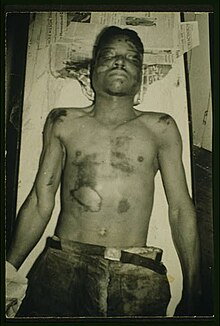1945 United States Supreme Court case
| Screws v. United States | |
|---|---|
 Supreme Court of the United States Supreme Court of the United States | |
| Argued October 20, 1944 Decided May 7, 1945 | |
| Full case name | Mack Claude Screws v. United States |
| Citations | 325 U.S. 91 (more)65 S. Ct. 1031; 89 L. Ed. 2d 1495 |
| Case history | |
| Prior | 140 F.2d 662 (5th Cir. 1944). |
| Procedural | Cert. granted, 322 U.S. 718 (1944). |
| Holding | |
| In general, a conviction under 18 U.S.C. §242 requires proof of the defendant's specific intent to deprive the victim of a federal right. In Screws, the prosecution has failed to prove such deliberate intent. | |
| Court membership | |
| |
| Case opinions | |
| Plurality | Douglas, joined by Stone, Black, Reed |
| Concurrence | Rutledge |
| Dissent | Murphy |
| Dissent | Roberts, joined by Frankfurter, Jackson |
Screws v. United States, 325 U.S. 91 (1945), was a 1945 Supreme Court case that made it difficult for the federal government to bring prosecutions when local government officials killed African-Americans in an extra-judicial manner. The case overturned the conviction of Baker County, Georgia sheriff Claude Screws for violating the civil rights of Robert Hall, who was lynched by Screws and two deputies on the grounds of the Baker County Courthouse.
Lynching of Robert Hall

Robert "Bobby" Hall was an African American mechanic and World War II veteran. Hall acquired a .38 semi-automatic pistol with a pearl handle during his overseas service, and was harassed by county sheriff Claude M. Screws upon returning to Baker County, Georgia. Screws confiscated Hall's pistol out of a belief that Black Americans should not own firearms. Robert Hall contacted a white attorney for assistance in the return of his firearm. Screws received a letter from Hall's lawyer on January 29, 1943, demanding that Hall, who had not been charged with any crime, have his property returned. The same day, Claude Screws produced a forged arrest warrant alleging Robert Hall had stolen a tire. Hall was subsequently arrested at his home by two deputies at the request of Screws. Upon arriving at the Baker County Courthouse grounds, the two deputies and the inebriated sheriff Claude Screws then brutalized the handcuffed Hall for fifteen to thirty minutes in public view. Robert Hall fell unconscious during the beating, and died of his injuries within an hour.
Case
Following the lynching of Robert Hall, the local U.S. attorney convened a grand jury which indicted Screws, as well as Special Deputy Jim Bob Kelly and officer Frank Edward Jones, on charges of violating Hall's civil rights. All three men were convicted at the federal court house in Albany, Georgia. They were each sentenced to three years in federal prison and fined $1000. The conviction was upheld by the Circuit Court and then appealed to the Supreme Court. While the case was moving through the courts Screws was reelected as sheriff by a very wide margin.
The Supreme Court, in a decision authored by William O. Douglas, ruled that the federal government had not shown that Screws had the intention of violating Hall's civil rights when he killed him. This ruling greatly reduced the frequency with which federal civil rights cases were brought over the next few years.
See also
References
- Urofsky, Melvin I. (2004). "Mack Claude Screws". 100 Americans Making Constitutional History: A Biographical History. CQ Press. pp. 180–82. ISBN 9781452267258.
- Branch, Taylor (1988). Parting the Waters: American in the King Years, 1954–63. New York: Simon and Schuster. p. 408. ISBN 0-671-46097-8.
- Yeomans, Georgina C. (2015). "WHEN COPS ARE ROBBERS: RECONCILING THE WHREN DOCTRINE AND 18 U.S.C. § 242". Columbia Law Review. Retrieved October 23, 2023.
- Chalmers, David Mark (2005). Backfire: How the Ku Klux Klan Helped the Civil Rights Movement. Rowman & Littlefield. p. 74. ISBN 9780742523111.
- "Bascom Deaver Lynch Sheriff Denied Retrial Pittsburgh Courier Mar 11 1944". The Pittsburgh Courier. March 11, 1944. p. 5. Retrieved October 9, 2023.
- Waldrep, Christopher (2001). Racial Violence on Trial: A Handbook with Cases, Laws and Documents. ABC-CLIO. pp. 76.
Further reading
- Cohen, Julius (1946). "The Screws Case: Federal Protection of Negro Rights". Columbia Law Review. 46 (1): 94–106. doi:10.2307/1118266. JSTOR 1118266.
- Putzel, Henry Jr. (1951). "Federal Civil Rights Enforcement: A Current Appraisal". University of Pennsylvania Law Review. 99 (4): 439–454. doi:10.2307/3309630. JSTOR 3309630.
- Watford, Paul J. (2014). "Screws v. United States and the Birth of Federal Civil Rights Enforcement". Marquette Law Review. 98 (1): 465–486.
External links
- Text of Screws v. United States, 325 U.S. 91 (1945) is available from: Justia Library of Congress
- United States Supreme Court cases
- 1945 in United States case law
- Civil rights movement case law
- United States Supreme Court cases of the Stone Court
- Lynching deaths in Georgia (U.S. state)
- African-American history of Georgia (U.S. state)
- Baker County, Georgia
- Aftermath of World War II in the United States
- Military history of Georgia (U.S. state)